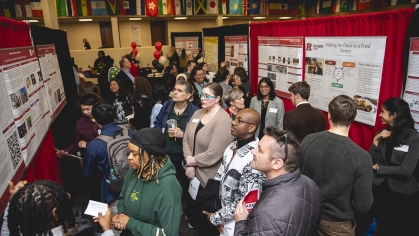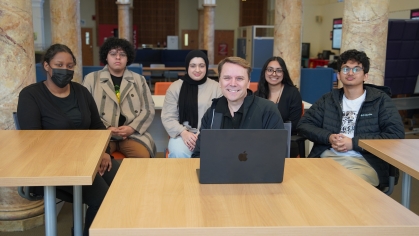Study Uses Mindfulness Meditation to Help Camden Residents Cope With Stress and to Improve Overall Health Before, During, and After the Pandemic
Mindfulness strategies and yoga sessions offered by Rutgers University‒Camden in the fall of 2019 came at an opportune time, teaching Camden residents skills to improve their physical and mental health and helping to deal with issues related to COVID-19 when the pandemic hit in New Jersey several months later.
Research suggests meditation and other mindfulness practices are helpful in reducing stress and medical and mental health issues.
The sessions led by two Rutgers‒Camden nursing professors are part of a study on the enduring benefits of mindfulness meditation. The research will appear in a forthcoming edition of the Journal of Psychosocial Nursing and Mental Health Services.

At Longwood Gardens, the participants enjoyed serene nature scenes and beautiful flowers.
“Mindfulness is a tool that would be useful in a situation where people are prone to reacting without necessarily thinking everything through,” says Sheila Linz, a Rutgers School of Nursing‒Camden assistant professor.
A psychiatric nurse practitioner and a co-leader of the mindfulness sessions, Linz says practicing mindfulness helps in guiding what people feel and do, by having them take a moment to breathe and think before they act.
In sessions offered at Rutgers‒Camden health centers located at the Housing Authority of Camden’s Ablett Village and Branches at Centerville, resident participants learned to handle stressful situations by utilizing a method called pause, relax, and open.
The group leaders instruct participants to inhale deeply, and then exhale. The simple mindfulness exercise allows the participants to pay attention in a moment without judgement and take their minds off the stressful situations they face daily.
The initial step of pausing helps break the autopilot stress cycle reaction. Relaxing the body loosens the muscles, making it easier to focus on the situation. Becoming open to what matters in the moment allows for focusing on the task at hand.
“Living in a low-income environment is a stressor,” says Kathy Jackson, a family nurse practitioner and Rutgers‒Camden clinical assistant professor of nursing, and the principal investigator of a study she and Linz conducted on the benefits of mindful practices to reduce stress. “You can use the tool anywhere and anytime in stressful situations to adjust how you are reacting to the situation.”
Linz, inspired by her former career as professional photographer, incorporated photography into the sessions. Using a research method known as photovoice, the photography supplemented the therapeutic group conversations about stressors, such as problems with family members, financial concerns, and violence in the neighborhood.

Kathy Jackson
In the two-hour-long sessions, the Rutgers‒Camden researchers provided an environment for positive social interactions and a space where the group members could learn how to calm down in a group setting or on their own. “We wanted to do some preventative measures about mental health so that you don’t have to address these issues after someone has some sort of mental breakdown as a result of depression or anxiety,” says Linz.
A professional photographer from New York volunteered to provide a photography tutorial to help the participants take photos to show what causes stress in their lives.
Safety is one of their major concerns. One participant shared a photo of bullet holes in a window from a shooting that occurred on her block.

A participant in the sessions took a photo of a rainbow to show a calming scene.
“The photovoice research method allows people to tell their story and make changes in their lives to create a new narrative,” Linz explains.
Participants took photos of what helps them reduce stress, sharing images including decorative features in their homes and colorful flowers from a group trip to Longwood Gardens in Kennett Square, Pa.
Visiting the botanical garden exposed the participants to sights and sounds that they do not experience in their neighborhood.
“We all respond to aesthetics,” says Linz. “All of us respond to what is going on around us, and when we are in cluttered, ugly, and concrete environments, we are affected by that.”
During the three months of mindfulness sessions, Jackson and Linz surveyed the participants about depression, loneliness, their quality of life, and the effects of meditation.
“The techniques we learned helped us get relaxed, clear our minds, and be more mindful in different places, not just in the group,” one participant said.
After learning the value of meditation, the participants were eager to continue meeting even after the sessions ended in early 2020. While they could not meet in person, Linz adapted by offering meditations by phone for about one month, and met with one of the participants individually for remote meditation and therapy sessions.

Sheila Linz
While pandemic restrictions continued after the meditation and wellness sessions ended, some participants reported that they applied the coping skills they learned to handle their fears and concerns about COVID-19 and issues related to the pandemic.
“When I would get stressed from the pandemic,” says another Camden resident, “I would feel the sunshine on my face and the breeze on my skin. I was able to let go of the things that bothered me by focusing on being mindful of the present moment.”
Jackson and Linz planned to hold an exhibit of the group’s photos in the Rutgers–Camden Nursing and Science Building in 2020 to provide mindfulness participants an opportunity to share their stories, but the event was canceled due to the pandemic.
The photos are in the process of being printed and will be displayed on the walls of the Rutgers‒Camden health centers at Ablett Village and Branches at Centerville. In addition, Jackson and Linz are planning a photography exhibit at the Rutgers School of Nursing‒Camden in the fall.



